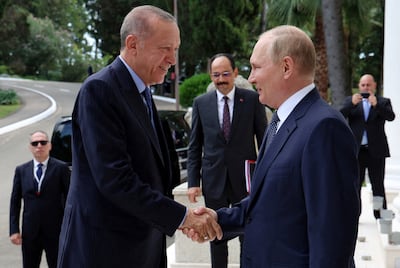Turkey has called for reconciliation between the Syrian government and opposition to ensure "lasting peace", drawing condemnation within the country.
Syria's conflict started after President Bashar Al Assad launched a deadly crackdown on protesters in 2011 that quickly descended into civil war. Many external actors, such as Turkey, Russia, Iran and the US, have been involved, further complicating the situation.
"We need to bring the opposition and regime together for reconciliation somehow, there will be no permanent peace otherwise," Turkey's Foreign Minister Mevlut Cavusoglu said on the sidelines of the Non-Aligned Movement meeting in Belgium.
Mr Cavusoglu met his Syrian counterpart Faisal Mekdad and said that contact between intelligence services of Turkey and Syria had resumed.
Turkey's top diplomat said it was vital that Syria maintained a strong central government to "prevent the disintegration of the country" and this would only be possible by uniting various factions of the country.
In recent years, Syria's opposition, mostly based abroad, has seen their influence wane as Iran and Russia steadfastly supported the government.
UN-backed peace talks have for years failed to make any progress and special envoy Geir Pedersen has highlighted “great mistrust on all sides”. The last round of constitutional talks stalled in March.
The National has reached out for comments from Syria's opposition members.
Mr Cavusoglu said Russian President Vladimir Putin had offered Turkish President Recep Tayyip Erdogan a meeting with Mr Assad.

Mr Erdogan this month issued a warning that he would invade northern Syria to establish a buffer zone that pushes out Kurdish groups.
Ankara has linked some Kurdish groups in Syria to those waging an insurgency against the Turkish state. These include the US-backed Kurdish People's Protection Units (YPG), which were a crucial part of an international coalition in the fight against ISIS.
The US and Russia, meanwhile, have called for restraint from Turkey.
Since 2016, Turkey has conducted three incursions into northern Syria, seizing hundreds of kilometres of land and pushing 30km deep into the country, in operations targeting mainly the YPG.
Turkish control of towns, which lie on or close to a central stretch of the 911km border with Syria, could extend its military presence from near the Mediterranean coast along nearly three quarters of the frontier.


